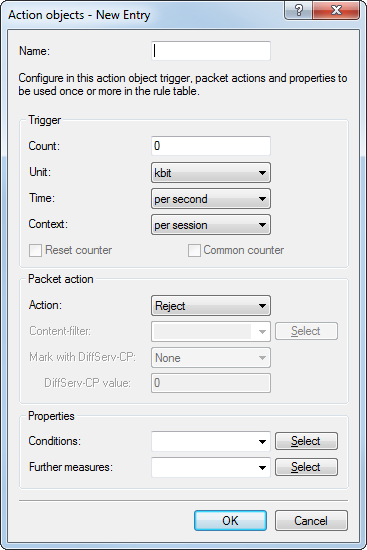Using the Action objects button, you define actions that the IPv6 firewall runs when a filter is true.
Click on Add to create a new action.

You can set the following properties for the object:
- Name
- Specifies the name of the object.
- Count
- When this limit is exceeded, the firewall performs the action.
- Unit
- Determines the unit for the limits. Select the corresponding value in the drop-down menu.
- Time
- Determines the measurement period that the firewall applies to the limit. Select the corresponding value in the drop-down menu.
- Context
- Determines the context that the firewall applies to the limit. Select the corresponding value in the drop-down menu.
- Reset counter
- If you enable this option, the firewall resets the counter after running the action.
Note: You can only activate this option if you set the Time value to "absolute".
- Common counter
- If you enable this option, the firewall adds all action triggers together in one counter.
Note: You can only activate this option if you set the Context value to "per station" or "global".
- Action
- Determines the action the firewall performs when the limit is reached.
The following options are possible:
- Reject
- The firewall rejects the data packet and sends an appropriate notification to the sender.
- Drop
- The firewall discards the data packet without notification.
- Transmit
- The firewall accepts the data packet.
- Check via proxy
- The proxy checks the data packet.
- Content filter
- The content filter profile. See Firewall settings for the content filter
- Mark with DiffServ-CP
- Determines the priority of the data packets (differentiated services, DiffServ), with which the firewall should transfer the data packets.
Note: You can only activate this option if you set the Action value to "Transmit".Note: Further information about DiffServ CodePoints is available in the section Quality of Service.
- DiffServ-CP value
- Determines the value for the Differentiated Services Code Point (DSCP).
Note: You can only activate this option if you set Mark with DiffServ-CP to the option "Value".
- Conditions
- Determines which conditions must be met in order for the action to be performed. You can specify the conditions under Conditions.
- Further measures
- Determines which trigger actions the firewall should start in addition to filtering the data packets. You can specify trigger actions under Further measures.
